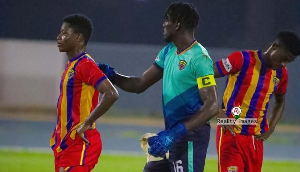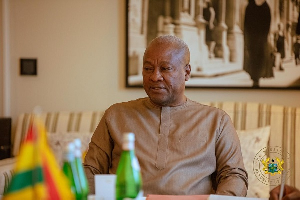The Vice Chancellor of the University of Ghana, Legon, Prof. Clifford Nii Boi Tagoe is under pressure from some formers students of the university to resign his position.
The former students led by the former President of the Junior Common Room (JCR) of the Commonwealth Hall, Benjamin Akyena Brantuo has called for the removal of the university's Vice Chancellor on multiple allegations of incompetence.
They alleged among other things that the University of Ghana is currently not only bedevilled with deep-seated corruption but also bedevilled with financial mal-administration that does not only sin against the public good, but stifles academic work.
Speaking at a Press Conference in Accra yesterday, Akyena Brantuo, who was last Friday, July 11, discharged by an Accra Circuit for want of prosecution on allegations of death threats, alleged that University was being ran in a manner he described as dictatorial and reckless, equating how Prof. Tagoe was running the University to mere Boy's Brigade.
This, he said, was evident in a report commissioned by a Visitation Panel on the finances of the University, which according to him "is at best a disgrace to anybody who has anything to do with the Institution.
Flanked by Messrs Ebenezer Hutornu and Akuban Amponsah Mensah, all products of the University, Akyena Brantuo quoted portions of the said report of the Panel which was chaired by Sir Charles Daniels, to support his claims.
Part of the report noted, “The investigation uncovered little positive to be said about the finance administrative system of the university. The team’s (visitation panel) view is that the financial administrative system at the University of Ghana is in a very bad state and is not providing anything approaching that services needed by the University, which needs radical changes.
Again, the financial administration of the University is a serious hindrance to the work of many of the Departments, Faculties and other units of the University, damaging its teaching, research and the students' experience, through inappropriate procedures and controls. It is widely seen as secretive, unhelpful and damaging to the University."
Despite the outward beautification of the Legon campus, he emphasised that conditions within Residential Halls threaten life. He noted that non-residents as well as residents pay hall attachment fees which are increased annually, whilst residential students pay residential fees as well as advances against anticipated damage to University property, in the sum of about GH¢30 per student.
Though students pay these monies religiously, he stressed that "they always get a raw deal and live in conditions that are not fit for human habitation."
For these and other reasons, Akyena Brantuo said he was not the least surprised that part of the panel’s report read, "Some members of the committee visited Commonwealth Hall and found it to be in a very poor state. Student numbers were about four times the number that the hall was designed to accommodate. Hygienic conditions were bad; indeed the toilets were locked up during our visit because of their horrible state and lack of water.”
“All the students in this overcrowded hall have to use the surrounding bushes as their toilet. Every available space was utilised for sleeping. These conditions were impacting the students psychologically and some of them were vociferous in their protest.”
Lighting in the hall was inadequate and lights in the corridors were not working. The dining facility had been converted to reading space. The panel was told that the other halls were in a similar shape. The committee therefore recommended that "the halls, particularly Commonwealth Hall, should be evacuated and rehabilitated."
The report further noted, students are not well represented on the governance of the university they are not satisfied with the constitutional role of the Dean of students, and wish to represent themselves in discussions with the university authorities.
We recommend “that the university introduces students' representation on the council, the academic board, the faculty boards and committees of these bodies as appropriate."
To say the least, Brantuo noted that "academic content and infrastructure for academic work are the worse victims of these administrative lapses and incompetence of the Tagoe-Ied administration."
He buttressed his claim in part of the visitation panel's report which said, ''The panel found during its visits to the Departments and Faculties that there was inadequate classroom and laboratory space for the large number of students.”
General News of Friday, 18 July 2008
Source: Joy
















